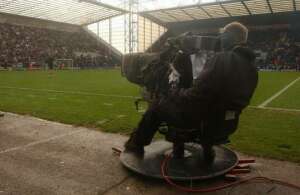|
It is almost impossible to contemplate the damage such a cataclysmic change in the footballing landscape would do to the game. It would virtually destroy the game at grassroots level, would deprive millions of football fans already unable to see their heroes in the flesh of any face to face contact with the game, and would therefore have untold consequences for the highest echelons of the game. The latest news from Old Trafford simply adds further irony to an already bitter pill.
Understandably, much of the blame is being directed at Carlton and Granada, the two media giants who have backed and masterminded a business run with breathtaking incompetence. It seems absurd that having spent such an extravagant sum of money on the right to the Football League, the company failed to ensure the product was properly marketed, or indeed make it available to every region of the country – absurd, in short, that they can run a business without making it economically viable – and then place the company in administration before washing their hands of any responsibility for the resulting crisis.
Yet apparently there is a piece of paper kicking around at the Football League which, had it been signed, would have held Carlton and Granada as co-guarantors of the contract. It was never signed. And if the courts fail to accept the legal arguments of the Football League – which will probably revolve around verbal guarantees allegedly given by the parent companies – heads should surely roll at the Football League amongst those responsible for such a gross oversight.
|
Regardless of whether Carlton and Granada are forced to pay up, there will have to be a massive re-evaluation of how the game, at all levels, is run. If the deal is not enforced by the courts, the inevitable consequence will be a combination of clubs going part-time in the lower leagues, and a number of them going to the wall altogether. If it is enforced, then the warning must be heeded, and the game should, whatever the size of the next TV deal, be able to cut its cloth accordingly.
Without greater redistribution of football's wealth, that might involve a degree of part-time football; it will almost certainly hasten talks over the restructuring of the Football League, and regional football, possibly achieved by combining the Third Division with the Conference, will once again have to be considered. Players at all levels will feel the pinch as clubs realise that such lucrative contracts are not viable. Perhaps more agreements like the one between Crewe and Liverpool should be considered, with larger clubs effectively becoming parents to smaller clubs, who could be used as a breeding ground for young prospects, or to rehabilitate players returning from long-term industry: Manchester United, say could take Bury under their wing – United do, after all, already use Gigg Lane for their reserve team fixtures, so this could represent a logical progression. If nothing else, it would show that the most powerful guardians of the game have a sense of their responsibility to the good of the game.
If any good can come of this whole sorry affair, it is surely that the episode should alert everyone to the potential for crisis that is rife within the game. Football can no longer build its empire upon promises that can, in a moment, become empty and worthless. Even the Premiership, so long a goldmine for all who inhabit it, can no longer sleep quite so easily. TV may not treat them so kindly in the future; debts such as those of Chelsea, which total almost 100 million pounds, can no longer be justified.
The game has to change. And even if this does prove to be merely a false alarm, the lessons have to be learnt, before it really is too late.


